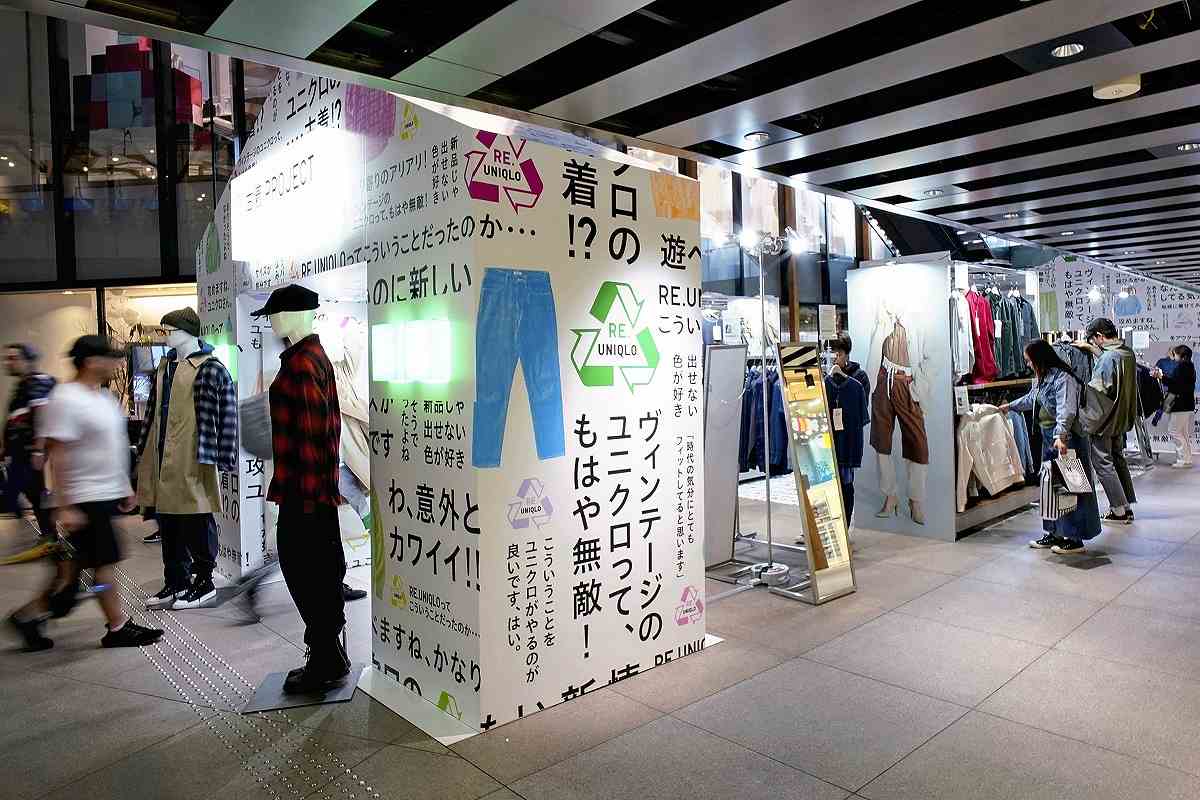
Customers browse through items sold as part of the Uniqlo Pre-owned Clothes Project at the brand’s Harajuku store in Tokyo on Oct. 17.
17:24 JST, January 5, 2024
TOKYO (AFP-Jiji) — A secondhand pop-up store in Tokyo by casual clothing giant Uniqlo was a first for the Japanese firm, but also a sign that a local aversion to used garments may finally be fading.
Uniqlo is a major player in an industry blamed for immense carbon emissions and other pollutants like microplastics.
It has ridden a wave of consumers buying, and throwing away, ever more clothes.
But in Japan, the world’s third-biggest clothes market, growing awareness of the sector’s huge environmental impact has yet to spark much interest in secondhand options.
Uniqlo’s Aya Hanada said the 10-day pop-up in the hip Harajuku district, where secondhand clothes were a third of their original price — with some dyed for a “vintage” look — showed attitudes were changing.
“I think the feeling of resistance to used clothing has disappeared in Japan, mainly among young people,” said the 45-year-old, who works for the firm’s recycling program RE.Uniqlo.
The change is in part thanks to the internet, she told AFP outside one of Uniqlo’s major stores, which allows customers to access items “without having to go all the way to a secondhand clothing store.”
‘A fashion thing’
There is still a long way to go, however.
In Japan, 34% of discarded clothing is recycled or reused, according to the Ministry of the Environment.
But this includes exports to developing countries, where the waste also often ends up in dumps or is incinerated.
Globally, the equivalent of a truckload of clothes is burnt or buried in landfill every second, according to the Ellen MacArthur Foundation, a charity focused on eliminating waste and pollution.
JapanConsuming, a market research firm, estimates that the Japanese secondhand segment represents less than 6% of the $75-billion market, albeit with strong growth in recent years.
For a long time in Japan, used clothes were a small niche confined to hipsters, JapanConsuming’s cofounder Michael Causton said.
“Maybe compared to somewhere like France and U.K. where the ecological, environmental factors probably came first, in Japan, it was a fashion thing,” Causton told AFP.
In Japan “there is a very strong concern with hygiene, that is a fixture of Japanese culture. And that definitely was a barrier for the average consumer,” he added.
Mercari effect
Alongside Fast Retailing-owned Uniqlo, which touts efforts to transform secondhand clothes into new products and also donates them to refugees and others in need, used garment specialist 2nd Street has expanded to 800 stores across Japan.
There has also been growth in online sales between individuals, driven mainly by the popular Japanese platform Mercari, where around a third of transactions by value are fashion items.
Secondhand Japanese clothes are even popular in China and elsewhere, Causton said, “because people know the Japanese look after their stuff and what they will send is a high level of quality.”
“I feel like in Japan, used clothes have a high quality … and if it’s not, it’s clearly stated if there’s any damage,” said Charlotte Xu, 18, an Australian tourist looking through a thrift store in Harajuku.
“In my home country everything is just in a pile, you have got to search it for yourself. Whereas here everything is nice and neat, and you can find what you want.”
Inflation
Rising prices, which after years of deflation have been hitting Japanese wallets since 2022, have also helped some to drop their opposition to secondhand.
“We conducted a user survey last year [in 2022] and it showed that clothes was the number one voted category for purchase on Mercari as a countermeasure against rising prices,” a Mercari spokesperson said.
But the biggest factor for many is simply whether something looks good or not.
“I am aware of the sustainable side of things, but I often buy them simply because they are stylish,” shopper Yamato Ogawa, 28, told AFP at the Uniqlo pop-up.

Sorted secondhand jeans are seen inside a holding cage at a warehouse in Inashiki, Ibaraki Prefecture, on Oct. 31.
Top Articles in Science & Nature
-

Japan Institute to Use Domestic Commercial Optical Lattice Clock to Set Japan Standard Time
-

Japan to Face Shortfall of 3.39 Million Workers in AI, Robotics in 2040; Clerical Workers Seen to Be in Surplus
-

Record 700 Startups to Gather at SusHi Tech Tokyo in April; Event Will Center on Themes Like Artificial Intelligence and Robotics
-

iPS Treatments Pass Key Milestone, but Broader Applications Far from Guaranteed
-

iPS Cell Products for Parkinson’s, Heart Disease OK’d for Commercialization by Japan Health Ministry Panel
JN ACCESS RANKING
-

Japan PM Takaichi’s Cabinet Resigns en Masse
-

Japan Institute to Use Domestic Commercial Optical Lattice Clock to Set Japan Standard Time
-

Israeli Ambassador to Japan Speaks about Japan’s Role in the Reconstruction of Gaza
-

Man Infected with Measles Reportedly Dined at Restaurant in Tokyo Station
-

Videos Plagiarized, Reposted with False Subtitles Claiming ‘Ryukyu Belongs to China’; Anti-China False Information Also Posted in Japan

























